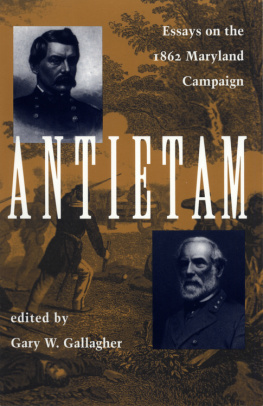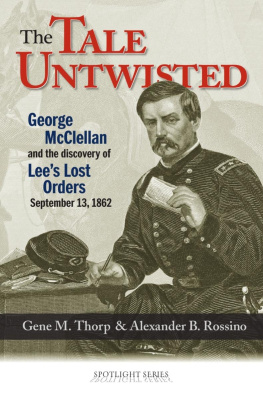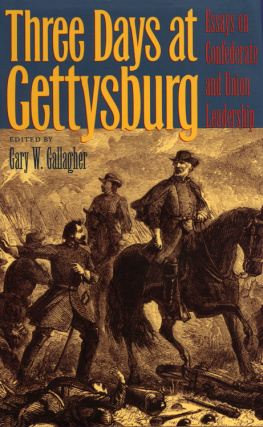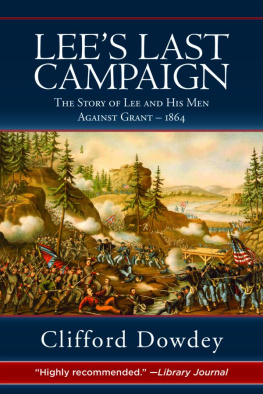In this Civil War Short, Gary W. Gallagher surveys Confederate sentiment in the summer of 1863 and argues that many southerners did not view the battle of Gettysburg as a resounding defeat. Gallagher makes the compelling case that, although southern casualties were tremendous, Confederates across the South, along with the vast majority of Lee's soldiers, persisted in viewing Robert E. Lee as an invincible commander whose army increasingly sustained the hopes of the nation. The work was originally published in The Third Day at Gettysburg and Beyond, edited by Gary W. Gallagher, which combines fresh evidence with the reinterpretation of standard sources to testify to the enduring impact of the Civil War on our national consciousness and refocus our view of the third day at Gettysburg.
Gary W. Gallagher is John L. Nau III Professor of History at the University of Virginia and author or editor of numerous books, including Causes Won, Lost, and Forgotten: How Hollywood and Popular Art Shape What We Know about the Civil War, and Lee and His Army in Confederate History
UNC Press Civil War Shorts excerpt rousing narratives from distinguished books published by the University of North Carolina Press on the military, political, social, and cultural history of the Civil War era. Produced exclusively in ebook format, they focus on pivotal moments and figures and are intended to provide a concise introduction, stir the imagination, and encourage further exploration of the topic. For in-depth analysis, contextualization, and perspective, we invite readers to consider the original publications from which these works are drawn.
Lees Army Has Not Lost Any of Its Prestige consists of the essay "Lee's Army Has Not Lost Any of Its Prestige: The Impact of Gettysburg on the Army of Northern Virginia and the Confederate Home Front," by Gary W. Gallagher, from The Third Day at Gettysburg and Beyond, edited by Gary W. Gallagher. 1994 The University of North Carolina Press. All rights reserved. Originally published as part of the Military Campaigns of the Civil War series, Gary W. Gallagher, editor.
www.uncpress.unc.edu
The Library of Congress has cataloged the original edition of this book as follows:
The Third day at Gettysburg and beyond / edited by Gary W. Gallagher.
p. cm. (Military campaigns of the Civil War)
Includes bibliographical references and index.
ISBN 0-8078-2155-1 (cloth : alk. paper).
1. Gettysburg (Pa.), Battle of, 1863. I. Gallagher, Gary W. II. Series.
E475.53.T56 1994
973.7349dc20 94-752
CIP
UNC Press Civil War Shorts ebook edition published in 2013
ISBN: 978-1-4696-1282-9
For more information on UNC Press ebook shorts, visit www.uncpressebookshorts.com.
LEES ARMY HAS NOT LOST ANY OF ITS PRESTIGE
The Impact of Gettysburg on the Army of Northern Virginia and the Confederate Home Front
Gary W. Gallagher
A canvass of Confederate sentiment in the summer of 1863 suggests that many southerners did not view the battle of Gettysburg as a catastrophic defeat. R. E. Lees soldiers typically saw it as a temporary setback with few long-term consequences for their army. Although conceding the conflicts heavy toll in casualties, they considered neither their withdrawal from the battlefield nor the retreat from Pennsylvania as evidence that the Federals had won a decisive victory. On the home front, civilians generally drew a sharp distinction between Gettysburg and Vicksburg. The latter represented an unequivocal disaster in which the Confederacy lost an entire army, huge quantities of arms, and reliable access to the states of the Trans-Mississippi. Gettysburg presented a far more ambiguous result, and few observers believed that it anticipated eventual failure in the Eastern Theater. In a season marked by the loss of Vicksburg and Port Hudson, the opening of major Union naval operations against Charleston, and Braxton Braggs inept maneuvering during the Tullahoma campaign, Lees operations in Pennsylvania did not stand out as especially harmful to the Confederate cause.
Yet Gettysburg and Vicksburg usually appear in the literature on the Civil War as twin calamities that marked a major turning point in the conflict. Emory Thomas struck a common note in his perceptive history of the Confederacy by observing that Gettysburg and Vicksburg, together with unsuccessful diplomatic initiatives in Europe, triggered among white southerners a severe loss of confidence in themselves. Similarly, James M. McPherson noted in his influential history of the Civil War and Reconstruction that the losses at Gettysburg and Vicksburg shook the Confederacy to its foundations. Both Thomas and McPherson cited Josiah Gorgas to illustrate their point. Events have succeeded one another with disastrous rapidity, wrote the Confederate chief of ordnance on July 28, 1863. One brief month ago we were apparently at the point of success. Lee was in Pennsylvania, threatening Harrisburgh, and even Philadelphia. Vicksburgh seemed to laugh all Grants efforts to scorn, & the Northern papers had reports of his raising the siege. Thirty days later, Lee had retreated from Pennsylvania, Vicksburg and Port Hudson had fallen, and irreplaceable men and matriel had been lost. Yesterday we rode on the pinnacle of successtoday absolute ruin seems to be our portion, stated an apparently shaken Gorgas. The Confederacy totters to its destruction. Quoting Gorgas as a man who best bespoke the mood in the South, Thomas concluded that evidence of Southern vincibility was very real in the summer of 1863.
Before I make the case that Gettysburg did not thrust most Confederates into depression, it is important to acknowledge that various witnesses did portray it and Vicksburg as comparably devastating reverses, questioned Lees generalship, or believed the campaign weakened the morale and reduced the physical prowess of the Army of Northern Virginia. Representative of the latter group was John B. Jones, the famous rebel war clerk, whose diary for July 9 read, The fall of Vicksburg, alone, does not make this the darkest day of the war, as it is undoubtedly. The news from Lees army is appalling. After prophesying on July 10 that if Lee returned to Virginia, a great revulsion of feeling would sweep the Confederacy, Jones recorded on July 17 that Gen. Lee has recrossed the Potomac! Thus the armies of the Confederate States are recoiling at all points, and a settled gloom is apparent on many weak faces. Robert Garlick Hill Kean of the Bureau of War reacted almost identically. This week just ended has been one of unexampled disaster since the war began, he wrote on July 12. In addition to Vicksburg and Braggs withdrawal, it turns out that the battle of Gettysburg was a virtual if not an actual defeat.
Similarly gloomy opinions existed within the Army of Northern Virginia. Our cause is, undoubtedly, at serious disadvantage just now, remarked William Nelson Pendleton, Lees chief of artillery, on July 18. The loss of Vicksburg is in itself not very injurious; but Grants army being set free to co-operate with Rosecrans is a serious evil. Our failure at Gettysburg and these events on the Mississippi will give us a vast deal of trouble. On the same day Pendleton wrote, one of Lees soldiers despaired about the fall of Vicksburg and Federal threats along the coast of North Carolina. Sarcastically alluding to Lees withdrawal across the Potomac as what we call retreat under cover of night, this North Carolinian hoped the war would soon end. The men are saying they will stop it next spring if nobody else can, he warned. You understand of coarse that I think they intend fighting no longer. They are looking for those men who can whip 10 Yankees to show up. If they dont we will be whipped.






